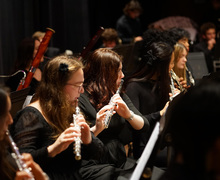States of mind
If there’s one thing Jeff Felt can’t live without, it’s Southern barbecue.
The mere vision of a little white package in his mailbox puts the Oklahoma native in a salivating frenzy.
Averting the suspicious glares of those around him, the special package is taken to his room for closer inspection. In a matter of moments, the aroma of smoked ribs begins to emanate from his door.
‘I always bring barbecue sauce from home to keep in my refrigerator,’ said the sophomore communication and rhetorical studies major. ‘Occasionally I get weird looks, but I always get the last laugh.’
Peculiar accents, unfamiliar colloquialisms and outlandish culinary preferences characterize a large and often misunderstood group of Syracuse University students: the non-New Englanders.
Students from other regions of the country are united by their desire to experience urban life in the Northeast. Their connection also lies in the seclusion they feel from their Eastern counterparts. Floridian Alyssa Gold, a senior television, radio and film major, said she hears her fair share of senior citizen comments, and gets the impression people think her state is only for old people.
‘They always ask ‘Do you live in a field?’ whenever I tell them I’m from Missouri,’ said Christine Ku, a freshman bioengineering major. ‘That is, of course, after asking me where Missouri is.’
According to the Office of Admissions, about 73 percent of the undergraduates enrolled last fall were permanent residents of the Northeast region. This raises several questions about why outside students choose Syracuse over local colleges, and what they often expect from a college experience in the Northeast. While many students, like Tom Ptsinski, a sophomore film drama major from Chicago, are drawn to SU because of its wide range of academic programs, others are simply looking for a new expedition.
‘I had no idea what the East Coast would be like,’ said Ben Halladay, a sophomore chemistry major from California. ‘I just knew it would be different, and wanted to see what the difference would be.’
While students who come from distant regions of the country are exposed to plenty of stereotypes, some admit that their own preconceptions played a role in the decision to move east.
‘You always have the impression that East Coast people are uptight, West Coast are laid-back, and the Midwest is somewhere in the middle,’ Ptsinski said. ‘I thought that people would be harder to get along with, but that turned out to be untrue.’
Some out-of-towners, such as Ptsinski, are pleased with the general attitude of people in the campus community. Others, however, regret the lack of similarities with their hometown atmosphere.
‘I miss the general attitudes of people from back home,’ said Erica Kriss, a sophomore painting major from Chicago. ‘In the Midwest, total strangers will just start conversations with each other, but in New York, people are in a rush and focused on themselves.’
Krystle Prantil, a senior chemical engineering major from Pennsylvania who spent last summer at an internship in Missouri, says the experience led to her belief that Easterners are more superficial.
‘No one goes out of their way here for you,’ Prantil said. ‘The people aren’t open at all. For example, even if they know you they may hesitate to say ‘Hi.”
One of the more obvious distinctions between visiting students and locals is vernacular, which creates confusion between words such as ‘soda’ and ‘pop’ or ‘bubbler’ and ‘water fountain.’
‘My friends make fun of me because I call Kimmel an eatery and I refer to pizza as pie,’ Florida-native Gold said. ‘And I call soft drinks soda, not pop.’
Felt receives criticism for not only the words he uses, but also the way in which he speaks.
‘People here don’t accept y’all as a word, so I try to use other words like ‘wicked,” he said. ‘They also tell me that I talk too slowly. I don’t think that I talk slowly, just other people talk fast.’
Another realm where students find themselves at odds with eastern natives is sports. The rivalry between the Red Sox and the Yankees, in particular, is a foreign concept to most outsiders, including Chadd Hanus, a sophomore mathematics major from Ohio, who said he didn’t realize how intense the competition was between the two teams until he moved to Syracuse. And sometimes, apathy toward Northeast sports teams stems from loyalty for home teams or a different sport altogether.
‘I miss sports from back home,’ Ku said. ‘I like the Chiefs and the Cardinals, and I usually root for teams with my friends, but here everyone’s all about the Red Sox.’
Instead of forcing outside students to assimilate their tastes and language, majority rule often influences a stronger bond between foreigners and their own roots.
‘When I was first meeting people here, a lot of people didn’t know where Oregon was,’ said Leslie McCollom, a senior printmaking major. ‘I felt more pride as a result. I felt like I had to prove it was cool because they had never heard of it.’
Published on October 26, 2004 at 12:00 pm





